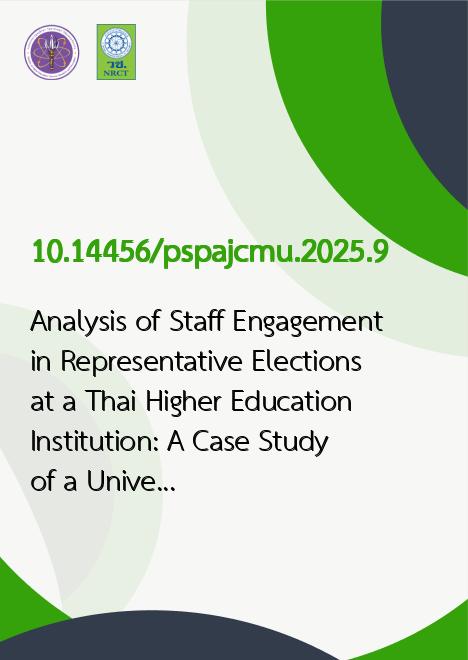
|
Analysis of Staff Engagement in Representative Elections at a Thai Higher Education Institution: A Case Study of a University Faculty |
|---|---|
| รหัสดีโอไอ | |
| Creator | Warissara Chaiyaphan |
| Title | Analysis of Staff Engagement in Representative Elections at a Thai Higher Education Institution: A Case Study of a University Faculty |
| Contributor | Pairin Boonprasert, Buarun Nilapha, Siri-Arun Saesow |
| Publisher | คณะรัฐศาสตร์และรัฐประศาสนศาสตร์ มหาวิทยาลัยเชียงใหม่ |
| Publication Year | 2568 |
| Journal Title | วารสารรัฐศาสตร์และรัฐประศาสนศาสตร์ |
| Journal Vol. | 16 |
| Journal No. | 1 |
| Page no. | 257-276 |
| Keyword | Social Participation, Staff Engagement, Academic Settings |
| URL Website | https://so05.tci-thaijo.org/index.php/polscicmujournal |
| Website title | Political Science and Public Administration Journal |
| ISSN | 2985-2269 |
| Abstract | This study analyzes the complex interactions between organizational structure and democratic practices by examining factors that influence staff participation in representative elections at Thailand’s Faculty of Tropical Medicine. Through an investigation of this premier national institution, the research reveals how traditional hierarchical structures in Asian academic settings intersect with modern democratic practices, addressing a critical gap in understanding non-Western academic contexts. Using a mixed-methods approach with 334 participants, the study combines questionnaires and in-depth interviews. The findings show high levels of knowledge (84.52%) but moderate actual participation (x? = 3.39, SD = 1.40). Analysis indicates that longer job tenure, greater election knowledge, and regular receipt of information are associated with higher participation. Staff with over 11 years of service exhibited 2.66 times higher participation than their less experienced colleagues. The LINE messaging app emerged as the predominant communication tool. Notably, staff with education below a bachelor’s degree demonstrated higher participation rates in both the election process (OR = 2.130, p = 0.003) and result evaluation (OR = 2.187, p < 0.001) compared to those with higher education. The study highlights patterns of knowledge sharing, communication effectiveness, and participation dynamics within academic institutions. These findings contribute to understanding participatory behaviors in non-Western academic settings and reveal patterns of institutional governance across diverse contexts. |